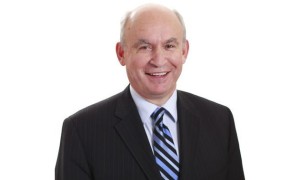
Lt. Gov. Byron Mallott sits at his desk, beneath the state seal Feb. 26. mallott heads up a new administration transboundary mines working group. (Ed Schoenfeld, CoastAlaska News)
The Walker-Mallott administration announced Wednesday that it’s set up a working group to address the transboundary mining boom near Southeast Alaska. The news comes as British Columbia’s mine-regulation agency plans meetings with Alaska fishermen and tribal groups.
Lt. Gov. Byron Mallott head ups the working group, which includes commissioners of the state departments of Natural Resources, Environmental Conservation and Fish and Game.
It’s looking into longstanding concerns about British Columbia mines slated to open or reopen on rivers that flow through Southeast Alaska.
“We view the entire range of activity on that side, which can affect the waters and the habitat of those river corridors, as important to Alaska’s interests and to our national interests and we will engage and pursue that interest vigorously,” he says.
Mallott says the group is just getting started and is gathering information from regulators, critics and supporters.
A new transboundary mines group, Inside Passage Waterkeeper, recently petitioned the administration to seek government-to-government talks with British Columbia’s premier.
The group wants the governor to ask for a moratorium on new tailings storage dams, including one being tested at the Red Chris Mine in the Stikine River watershed.
Mallott says he’s not yet ready to pursue any particular course of action.
“My desire is that we not seek specific responses until we understand fully what we are engaged with. But that doesn’t mean that anything is off the table, either,” he says.
B.C. Premier Christy Clark is an ardent advocate of mining. She’s added staff to the provincial mining agency to speed permitting, so new projects can open sooner.
Bill Bennett, her energy and mines minister, came to Anchorage in November to explain his government’s approach and actions.
He met with state officials and addressed Alaska’s mining association. But says he realizes he was not meeting with the right people.
“We need to make a second trip. Whether I go along on that trip or not is still up in the air. But we certainly need to reach out and give the people of Southeast Alaska an opportunity to meet and talk to our officials,” he says.
Bennett wants to engage fisheries and tribal groups, where provincial officials can explain their mine-review process. It’s unclear whether environmental groups will be included.
“We’re not really going to come to Alaska and be lectured,” he says.
Details of mine ministry’s visit, such as dates and locations, are not set.
But fishermen and tribal members are among those most strongly protesting mineral development near cross-border rivers.
“We would welcome Mining Minister Bill Bennett with open arms. That’s one thing that’s been lacking is consultation and transparency,” says Rob Sanderson Jr., who co-chairs the United Tribal Transboundary Mining Work Group and is a vice president of the Tlingit-Haida Central Council.
Both groups cite August’s Mount Polley tailings-dam breach in eastern British Columbia. A report reviewing what went wrong there estimated a similar dam would fail every five years, releasing hazardous water, silt and rock.
Sanderson says that raises questions about the future.
“We’re doing this to protect our environment for our children and grandchildren and the yet unborn. We want them to enjoy the same things that we are enjoying right now – pristine rivers and clean water,” he says.
State officials at a lower level are already talking to British Columbia’s mining ministry.
Department of Natural Resources Large Mine Project Manager Kyle Moselle says he urged staff to travel to Southeast when they met in Vancouver in January.
“The point that I made to them or stressed to them was that many of the stakeholders that I’ve talked with … feel frustrated or disenfranchised from British Columbia’s administrative process, their environmental review process,” he says.
British Columbia has also recommended the issue be put before the Pacific Northwest Economic Region. That’s a cross-border development think-tank.
Southeast Alaska Conservation Council Mining Coordinator Guy Archibald, who is also part of Inside Passage Waterkeeper, says that’s not the best approach.
“They’re an economic development organization and they don’t really have any working groups for environmental protection,” he says.
Meanwhile, the state’s new working group will meet again in a few weeks.
Lt. Gov. Mallott, its chairman, says while he hopes it will have an impact, it faces limits.
“Alaska has no triggers to pull that would allow immediate action,” he says.

































